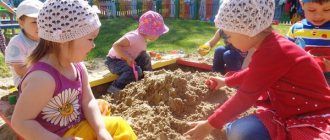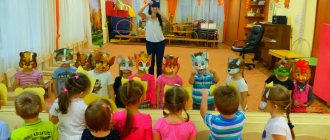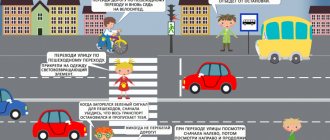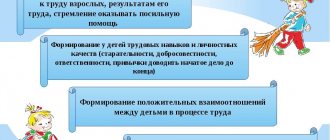The main forms of organizing interaction between preschool educational institutions and families in the context of the Federal State Educational Standard for Preschool Education
The goal of a modern preschool educational institution is the comprehensive formation of a child’s personality, taking into account his physical and mental development, individual capabilities and abilities. But such development cannot occur without close interaction between the preschool educational institution and the family. Family is the first institution in a child’s life.
The further development of the child depends on the joint work of parents and teachers. And it is the quality of work of preschool educational institutions, in particular teachers, that determines the level of pedagogical culture of parents, and, consequently, the level of family education of children. Therefore, modern family and preschool education should not be considered as autonomous areas of preschooler development.
The federal state educational standard for preschool education meets new social demands, one of which is the interaction of a preschool institution with children’s families for more successful implementation of the basic general education program of a preschool educational institution. The Federal State Educational Standard for Preschool Education places new demands on improving the content, forms and methods of interaction between the social partnership of the family and the preschool educational institution, which must be considered as a resource for the sociocultural development of the child.
The Federal State Educational Standard for Preschool Education states that work with parents should have a differentiated approach, taking into account social status, family microclimate, parental requests and the degree of parental interest in the activities of the preschool educational institution. The Federal State Educational Standard for Education is the basis for assisting parents (legal representatives) in raising children, protecting and strengthening their physical and mental health, developing individual abilities and the necessary correction of their developmental disorders.
Today, the leading and organizing role of the kindergarten in relation to the family is characterized by a complex of factors:
- systematic, active dissemination of pedagogical knowledge among parents;
‒ practical assistance to families in raising children;
‒ organizing the promotion of positive experiences in public and family education;
- involving parents in teaching activities.
What forms of organizing interaction between preschool educational institutions and families are relevant today? And the forms can be used as traditional ones:
- parent meetings;
‒ individual consultations at the request of parents with teachers and specialists;
‒ information stands where consulting material is selected on topics of interest;
‒ photo reports and filming of various activities in each group and the entire preschool educational institution.
So and non-traditional:
‒ issues of intra-kindergarten newspapers, on the pages of which parents can share their experience of family education;
- exhibitions of family creativity;
‒ various master classes with the participation of parents;
‒ “feedback diaries”, where teachers and parents tell each other about their children’s achievements;
‒ organization of various joint projects (“School of a Caring Parent”, “Healthy Family”, etc.) in order to solve the problem of strengthening the family as a social unit;
‒ organizing family clubs that allow you to create a situation of success for each family, without exception, and which is accompanied by positive emotions of the participants in the parent-child team, allows you to take into account the individuality of each participant, both adults and children;
‒ using the kindergarten website to inform parents about the activities of the institution, provide advice on various issues, and organize feedback;
- joint holidays with parents and children.
Such forms of work will make it possible to organize a high degree of awareness of parents about the state of affairs in the kindergarten with the aim of better development and education of children not only in preschool educational institutions, but also at home, to intensify the willingness of parents to participate in all areas of the activities of the preschool institution, and to establish a positive psychological climate in relationships “ parents - children - teachers." But the most important thing in organizing interaction between preschool educational institutions and families is to retreat from formalism in organizing this activity. It is necessary to strive for dialogue, take into account the social demand (interests, needs and requirements of parents in matters of development and upbringing of children), organize the “openness” of the preschool institution for parents.
Today, of course, the initiative comes more from teachers, but we can already say that parents are increasingly responding to teachers’ proposals for cooperation and signs of renewal in the interaction of teachers with families are clearly occurring.
Our preschool institution, as part of the implementation of the federal state educational standard for preschool education, pays great attention to interaction with parents (legal representatives) of pupils. Together with the parents, we created a portfolio for each child, which contains the pages “Advise me” and “Ask, parents”, where the parents are
can ask a question that interests them, and specialists working with the child can give recommendations and help in resolving the issue that arises for parents.
Creative workshops with the participation of children and parents also resonated with parents, when mothers and their children demonstrate artistic creativity in productive activities and share their talent with other mothers. Holding joint creative competitions “Sorceress “Autumn”, “Christmas Tale”, “Winter Town” arouses genuine interest among parents and pupils and allows all family members to participate.
Parents of our students are happy to take part in organizing joint theatrical activities, holding “Round Tables” on various topics, and taking part in celebrations and entertainment. The campaigns “Bird Day”, “Tree in the Palms”, “Every Speck in a Basket”, “Joint Environmental Cleanup Day” are held with great desire. All of them are aimed at family cooperation within the framework of not only the formation of an environmental culture, spiritual, moral and patriotic qualities of preschoolers, the development of the child’s personality, but also increasing the responsibility and role of parents in raising their child.
The organization of joint sports events “Autumn Family Marathon”, “Winter Spartakiad”, “Mom, Dad, Me - a Healthy Family” is aimed at creating the foundations of a healthy lifestyle for adults and children, improving the psychological climate of the family and the institution.
Many of these events have become traditional for the kindergarten and parents.
Thus, the use of various forms of interaction between the preschool educational institution and the family - two important social institutions for the socialization of the child - produces positive results. With all their work, the teaching staff of the kindergarten proves to parents that their involvement in teaching activities, their interested participation in the educational process is important not because the teacher wants it, but because it is necessary for the development of their own child. And the implementation of the Federal State Educational Standard for Preschool Education makes it possible to organize the joint activities of the kindergarten and the family more effectively, which allows parents to be not spectators and observers, but active participants in the life of their child.
Literature:
1. Magazine “Preschool Education Management”, 2013.
2. Lyubchik S. A. Basic forms of organizing interaction between preschool educational institutions and families / Preschool educational institutions management. 2013. No. 6.
3. Federal state educational standard for preschool education - M., 2013.
Federal State Educational Standard for Education on interaction with parents of preschool childrenmaterial on the topic
Memo for teachers
GEF DO
about interaction with parents
pupils
One of the principles formulated in the Federal State Educational Standard for Educational Education is:
- Personal developmental and humanistic nature of interaction between adults (parents (legal representatives), teaching and other employees of the Organization) and children (part 1, clause 1.2, clause 2)
One of the basic principles of preschool education is:
- Cooperation of the Organization with the family (part 1, clause 1.2., clause 5).
One of the tasks that the Standard is aimed at solving is:
- Combining teaching and upbringing into a holistic educational process based on spiritual, moral and sociocultural values and socially accepted rules and norms of behavior in the interests of the individual, family, society (Part 1, Clause 1.6, Clause 2)
- Providing psychological and pedagogical support for the family and increasing the competence of parents (legal representatives) in matters of development and education, protection and promotion of children’s health (Part 1, paragraph 1.6., paragraph 9).
The standard is the basis for:
- Providing assistance to parents (legal representatives) in raising children, protecting and strengthening their physical and mental health, developing individual abilities and the necessary correction of their developmental disorders (part 1, clause 1.7., clause 6)
The standard specifies requirements that are aimed at creating a social development situation for participants in educational relations, including the creation of an educational environment that:
- Ensures openness of preschool education (Part III, clause 3.1, clause 5)
- Creating conditions for the participation of parents (legal representatives) in educational activities (Part III, clause 3.1., clause 6)
- One of the psychological and pedagogical conditions for the implementation of basic educational programs of preschool education is:
- Support for parents (legal representatives) in raising children, protecting and promoting their health, involving families directly in educational activities (Part III, clause 3.2.2, clause 8)
- Also, Part III of the Standard specifies conditions aimed at creating a social situation for the development of children that corresponds to the specifics of preschool age:
- Interaction with parents (legal representatives) on issues of the child’s education, their direct involvement in educational activities, incl. through the creation of educational projects together with the family based on identifying the needs and supporting the educational initiatives of the family (Part III, clause 3.1., clause 6)
- In order to effectively implement the educational program, conditions must be created for:
- Advisory support for teaching staff and parents (legal representatives) on issues of education and child health, incl. inclusive education (if it is organized) (part III, clause 3.1., clause 6)
- The Organization must also create opportunities, incl. to provide information about the Program to the family and all interested parties involved in educational activities, as well as the general public (Part III, clause 3.1., clause 6)
Interaction of the teacher with the families of pupils within the framework of the implementation of the Federal State Educational Standard for preschool education
Bibliographic description:
Klevtsova, M. N. Interaction of a teacher with the families of pupils within the framework of the implementation of the Federal State Educational Standard for preschool education / M. N. Klevtsova, S. F. Khodeeva. — Text: direct // Pedagogical skills: materials of the IX International. scientific conf. (Moscow, November 2016). - Moscow: Buki-Vedi, 2016. - pp. 126-128. — URL: https://moluch.ru/conf/ped/archive/208/11249/ (access date: 01/03/2022).
At the present stage of updating preschool educational policy, much attention is paid to the problems of family, family education, cooperation between family and educational institution. Therefore, the most important condition for improving the preschool education system is the activities of teachers focused on mastering new innovative forms of interaction with parents.
The documents of the Ministry of Education and Science of the Russian Federation discuss an updated educational strategy to create optimal conditions for the successful education and development of preschool children, interaction with parents and social partners.
In accordance with the Law “On Education in the Russian Federation,” one of the main tasks facing a preschool institution is “interaction with the family to ensure the full development of the child’s personality.”
The new federal state educational standard for preschool education (FSES DO), which meets new social needs and in which much attention is paid to working with parents, states that work with parents of pupils should have a differentiated approach, taking into account social status, family microclimate, parental needs and the degree of interest of parents in the activities of preschool educational institutions, increasing the culture of pedagogical literacy of the family. Requirements for the interaction of the organization of work with parents have also been formed.
The problem of interaction between kindergarten and family has always been relevant and difficult. Relevant because only in close cooperation and mutual understanding between teachers and parents can high results in the development of children be achieved. And difficult, because all parents are different; they, like children, need a special approach.
To successfully cooperate with parents, you must adhere to the following principles of interaction:
- Friendly style of communication with parents. Every day during consultations and conversations, try to create partnerships and trusting relationships.
- Individual approach. It manifests itself in daily contact when parents bring and pick up their children.
- Collaboration, not mentoring. In pedagogical situations, communicate “as equals,” where no one has the privilege to indicate, control, or evaluate.
- Serious preparation. Any, even the smallest, event to work with parents must be carefully and seriously prepared.
- Dynamism. Due to the fact that today kindergarten is in development mode and is a mobile system, it is necessary to quickly respond to changes in the social composition of parents, their educational needs and educational requests. Depending on this, the forms of work with families change.
In order to make parents active participants in the pedagogical process and responsible for the upbringing and education of children, the following tasks are defined:
- Establish partnerships with the family of each student.
- To combine the efforts of family and kindergarten for the development and education of children.
- Create an atmosphere of mutual understanding between parents, students and kindergarten teachers, and emotional mutual support.
‒ Activate and enrich parents’ skills in raising children.
‒ Maintain parents’ confidence in their own teaching capabilities.
The Federal State Educational Standard for Educational Education formulates the main directions of work with parents:
- Cognitive direction. Goal: aimed at familiarizing parents with the age and psychological characteristics of preschool children, developing practical skills in raising children in parents.
- Information and analytical direction. Goal: aimed at identifying the interests, needs, requests of parents, the level of their pedagogical literacy, establishing emotional contact between teachers, parents and children. Helps to better navigate the pedagogical needs of each family and take into account individual characteristics.
- Visual and information direction. Purpose: makes it possible to convey to parents any information in an accessible form, to tactfully remind them of parental duties and responsibilities. Kindergarten begins with the locker room; it is very important that it is cozy and beautiful, so our parent corners are bright and attractive.
- Leisure direction: Goal: designed to establish warm, trusting relationships, emotional contact between teachers and parents, between parents and children.
Therefore, the following forms of work are actively used:
Cognitive direction, which includes:
- parent meetings and round table meetings;
- consultations and individual conversations;
‒ project activities;
‒ exhibitions of children's works and crafts made together with parents;
One of the main forms of work on pedagogical education of families is parent meetings and round table meetings - for example, at the parent meeting “So we have become a year older,” the age-related characteristics of children’s development and ways of developing their communicative qualities are revealed. During the round table discussion “Formation of a healthy lifestyle of a preschooler in kindergarten”, together with parents, issues of introducing children to a healthy lifestyle are discussed, and they become acquainted with the most effective forms of interaction with children on a healthy lifestyle in kindergarten.
In individual consultations and conversations with parents: “If a child does not eat well”, “Joint work in the family”, “We dress children according to the season”, “Why is a child capricious”, “Walks and their importance for strengthening the child’s health”, assistance is provided on or any other educational issue, qualified advice is given.
Nothing brings parents closer together than doing something interesting together, aimed at the benefit of their children and their development. The opportunity to become participants in the educational process, organizers, and not observers.
When working with parents, good results are achieved by organizing project activities in kindergarten. As a rule, any project includes a block of work with the family. This includes the creation of an exhibition, the production of attributes, competitions, excursions, parent meetings, stand design and much more. With such an integrated approach, parents become the most active helpers and faithful associates in any endeavor. Work on projects is ongoing, and the participation of parents in them is already a tradition. For example, during the project “Acquaintance with the profession “Seller””, parents make various attributes for the role-playing game “Shop”, and talk with children about the rules when visiting a store.
The “Healthy” project produces non-standard physical education equipment and corrective paths for strengthening children. At the parent meeting, they share their experiences in introducing children to a healthy lifestyle.
The next important area is information and analytical, which includes:
- survey;
- testing;
- personal conversations.
In order to study the family, parents fill out “Social Passports” to determine the social status of the family, a questionnaire “Assessing the quality of educational provision. Personal conversations are held, this helps to better navigate the pedagogical needs of each family and takes into account individual characteristics. These forms help to properly organize work with parents, make it effective, and select interesting forms of interaction with the family.
One of the areas is visual information, which includes:
- consultations;
- information booklets;
- reminders;
- information sheets;
- sliding folders;
‒ advertisement for a kindergarten.
In groups, parent corners are set up, which contain informational materials: daily routine, class schedule, anthropometric data of children, advisory material, advice, announcements of various types.
An important area is leisure, which includes:
- holidays;
- entertainment;
- leisure.
As a result of festive meetings, positive relationships between parents and their children are formed and emotional contact is established. Entertainment and leisure activities are not carried out for parents, but with the involvement of parents. This is done so that they know how much trouble and work needs to be put into preparing any celebration. For example, during the leisure time “A Friendly Family Together”, parents take an active part: fathers and children build houses, mothers dance with children, and at the end a joint fairy tale “Turnip” is shown.
Together with your children, you can congratulate your parents on the holidays. Publish wall newspapers “Our dads are brave soldiers”, “My beloved mommy”. Collective works are being made: “Basket with snowdrops”, “Bouquet of daisies”.
The use of various forms of work gives certain results: parents become active participants in meetings and assistant teachers, and an atmosphere of mutual respect is created.
Interaction between parents and kindergarten rarely occurs immediately. This is a long process, long painstaking work, requiring patient, unwavering pursuit of the chosen goal, and a constant search for new ways of cooperation with parents. Family and kindergarten cannot replace each other, but must interact for the sake of the full development of the child.
Literature:
- Interaction between family and preschool educational institution/ comp. N. A. Kochetova, I. A. Zheltikova, M. A. Tveretina, - Volgograd: 2014.
- Osipova L. E. Work of a kindergarten with a family, M., Scriptorium Publishing House, 2008.
- Workshop on professional communication of teachers: recommendations, games, trainings, author-compiler O. M. Eltsova, - Volgograd: Teacher, 2011.
- Prokhorova G. A. Interaction with parents in kindergarten, - M.: Iris-press, 2009.
- Sertakova N. M. Innovative forms of interaction between a preschool educational institution and the family, - St. Petersburg: Detstvo-press, 2013.
- Social partnership between kindergarten and parents: collection of materials / comp. T. V. Tsvetkova, - M.: Sphere shopping center, 2013.
Key terms
(automatically generated)
: kindergarten, parent, child, parent meeting, healthy lifestyle, family, emotional contact, cognitive direction, project activity, Russian Federation.





